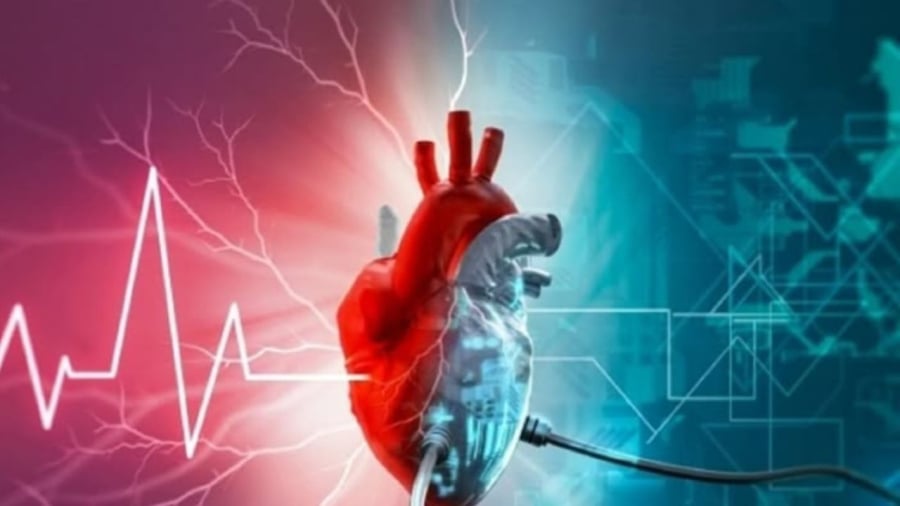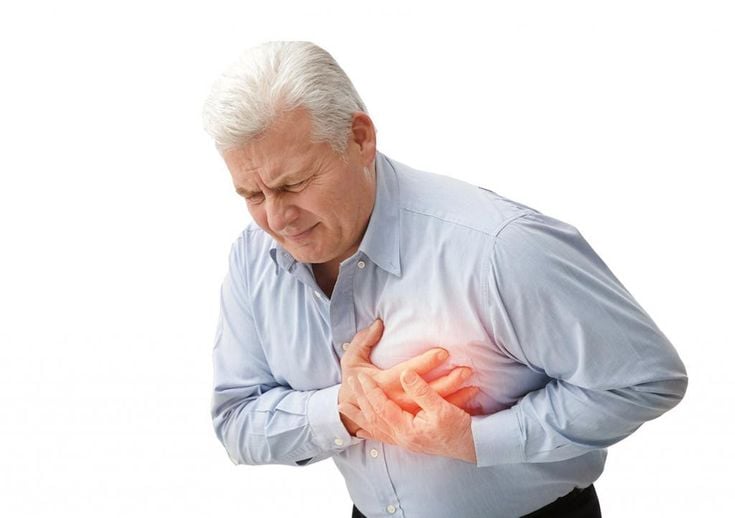Myocardial infarction, or heart attack, is a leading cause of sudden death globally, including in Vietnam. It occurs when the blood supply to the heart is significantly blocked, often due to a blood clot or atherosclerosis. Worryingly, a heart attack can strike anyone at any time, and without timely treatment, the risk of death within minutes is very high.
Therefore, early recognition of the warning signs of a heart attack is key to protecting yourself and your loved ones. The following are typical signs that you should not ignore.

1. Chest Pain – A Classic Sign
The most common and easily recognizable symptom of a heart attack is chest pain. Patients often experience a sharp, heavy, or crushing pain in the center of the chest. This pain may radiate to the neck, left shoulder, arm, or even the back and jaw.
The pain usually lasts for more than 15 minutes and does not subside with rest or regular vasodilator medication. However, many people, especially women and the elderly, may not experience prominent chest pain but rather more subtle symptoms.
2. Sudden Shortness of Breath
If you experience shortness of breath or breathlessness without strenuous activity or while at rest, it could indicate that your heart is not pumping blood efficiently. When a heart attack occurs, the damaged heart struggles to circulate blood, making the patient feel like they are “suffocating” and need to sit up straight to feel better.

3. Unusual Fatigue
Fatigue is a symptom that is often overlooked and attributed to insomnia or work stress. However, if you feel prolonged exhaustion for several days or unexplained tiredness, especially when doing light activities such as walking or climbing stairs, don’t ignore it—your heart may be sending out an SOS.
4. Cold Sweat
Breaking out in a cold sweat suddenly, even when not in a hot environment or engaging in strenuous activity, is a dangerous sign of a heart attack. The body’s response to blood vessel blockage is to sweat to cool down and lower blood pressure—a self-protective mechanism, but also a red flag.
5. Nausea, Dizziness, and Lightheadedness
Not many people know that nausea, vomiting, a feeling of fullness, or upper abdominal pain can be cardiac symptoms. These symptoms are often mistaken for digestive disorders. Accompanying these, if you experience dizziness or feel faint, immediately consider cardiovascular risk, especially if you have high blood pressure, diabetes, smoke, or are overweight.
6. Irregular Heartbeat – Palpitations
The feeling of a rapid, irregular, or skipped heartbeat is also noteworthy. Many describe it as “my heart is jumping into my throat,” an overwhelming sense of anxiety for no apparent reason. This could be the nervous system’s reaction to sudden oxygen deprivation due to coronary artery blockage.
7. Numbness or Pain in the Left Arm or Back
A less obvious sign is numbness or pain radiating from the chest to the left arm, shoulder, or back between the shoulder blades. This occurs when pain signals from the heart reach other nerve areas, especially the left arm, which has a close neural connection to the heart.
Who Is at High Risk?
People with the following factors should be especially vigilant for signs of a heart attack:
- Individuals over 50, especially men
- Those with a history of hypertension, diabetes, or dyslipidemia
- Smokers and regular alcohol consumers
- Sedentary individuals or those who are obese
- Those with a family history of cardiovascular disease
What to Do If You Suspect a Heart Attack?
If you or a loved one experience any of these suspicious symptoms, call the emergency services (115 in Vietnam) immediately. Do not drive yourself to the hospital or wait to see if the symptoms subside. While waiting for help, the patient should rest completely, sitting or lying down with their head slightly elevated. If aspirin is available, chewing one tablet may help thin the blood, but only if advised by a doctor.
While myocardial infarction is a “silent killer,” the consequences can be prevented with early detection and timely treatment. Listening to your body and recognizing warning signs such as chest pain, shortness of breath, unusual fatigue, or cold sweats will help you take a proactive approach to cardiovascular health.
Remember, do not underestimate any symptoms, especially if you are in a high-risk group. Proactive health checks and a healthy lifestyle are key to maintaining a strong heart and prolonging life.
































